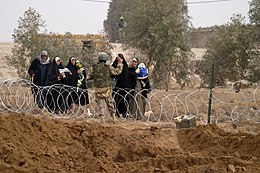
1990 (MCMXC) was a common year starting on Monday of the Gregorian calendar, the 1990th year of the Common Era (CE) and Anno Domini (AD) designations, the 990th year of the 2nd millennium, the 90th year of the 20th century, and the 1st year of the 1990s decade.

Suffrage, political franchise, or simply franchise is the right to vote in public, political elections and referendums. In some languages, and occasionally in English, the right to vote is called active suffrage, as distinct from passive suffrage, which is the right to stand for election. The combination of active and passive suffrage is sometimes called full suffrage.
Women's suffrage is the right of women to vote in elections. In the beginning of the 18th century, some people sought to change voting laws to allow women to vote. Liberal political parties would go on to grant women the right to vote, increasing the number of those parties' potential constituencies. National and international organizations formed to coordinate efforts towards women voting, especially the International Woman Suffrage Alliance.

A presidential system, or single executive system, is a form of government in which a head of government, typically with the title of president, leads an executive branch that is separate from the legislative branch in systems that use separation of powers. This head of government is in most cases also the head of state. In a presidential system, the head of government is directly or indirectly elected by a group of citizens and is not responsible to the legislature, and the legislature cannot dismiss the president except in extraordinary cases. A presidential system contrasts with a parliamentary system, where the head of government comes to power by gaining the confidence of an elected legislature.
Universal suffrage or Universal franchise ensures the right to vote for as many people who are bound by a government's laws as possible, as supported by the "one person, one vote" principle. For many, the term universal suffrage assumes the exclusion of youth and non-citizens, while some insist that much more inclusion is needed before suffrage can be called universal. Democratic theorists, especially those hoping to achieve more universal suffrage, support presumptive inclusion, where the legal system would protect the voting rights of all subjects unless the government can clearly prove that disenfranchisement is necessary. Universal full suffrage includes both the right to vote, also called active suffrage, and right to be elected, also called passive suffrage.
This is an index of articles related to the issue of feminism, women's liberation, the women's movement, and women's rights.

Elections in Kuwait are held for both the National Assembly and for the Municipality. Kuwait's constitution calls for elections to the unicameral National Assembly at a maximum interval of four years. Elections are held earlier if the Constitutional Court or Emir dissolve the parliament.

The Müsavat Party is the oldest existing political party in Azerbaijan. Its history can be divided into three periods: Early Musavat, Musavat-in-exile and New Musavat.

Women's suffrage – the right of women to vote – has been achieved at various times in countries throughout the world. In many nations, women's suffrage was granted before universal suffrage, in which cases women and men from certain socioeconomic classes or races were still unable to vote. Some countries granted suffrage to both sexes at the same time. This timeline lists years when women's suffrage was enacted. Some countries are listed more than once, as the right was extended to more women according to age, land ownership, etc. In many cases, the first voting took place in a subsequent year.

The National Assembly, also transliterated as Milli Mejlis, is the legislative branch of government in Azerbaijan. The unicameral National Assembly has 125 deputies: previously 100 members were elected for five-year terms in single-seat constituencies and 25 were members elected by proportional representation; as of the latest election, however, all 125 deputies are returned from single-member constituencies.
Movements for Muslim women to seek roles in national leadership have increased rapidly. Greater opportunities for women in education have further encouraged their involvement in politics. The most prominent Muslim female leaders are former prime minister of Pakistan Benazir Bhutto, Indonesian President Megawati Sukarnoputri (2001–2004), former Turkish Prime Minister Tansu Çiller (1993–1996), former Senegalese Prime Minister Mame Madior Boye (2001–2002), Bangladeshi Prime Ministers Khaleda Zia and Sheikh Hasina Wajed, former Iranian Vice President Masoumeh Ebtekar (1997–2005), former Malian Prime Minister Cissé Mariam Kaïdama Sidibé (2011–2012), Kosovan President Atifete Jahjaga (2011–2016), former President of Mauritius Ameenah Gurib (2015–2018), former President of Singapore Halimah Yacob (2017–2023) and current President of Tanzania Samia Suluhu Hassan
Black suffrage refers to black people's right to vote and has long been an issue in countries established under conditions of black minorities as well as, in some cases black majorities.
The first bill which would have given women the right to vote in Kuwait was put to the parliament in 1963. It was ultimately overturned due to pressure from the Al Sabah ruling family. Bills continued to be denied through 1985 and 1986. Kuwait then became heavily involved in the Iraq-Iran war, and women began demanding recognition for their efforts in keeping their families and society functional. The parliament agreed and the first woman was finally appointed as the ambassador of the Persian Gulf in 1993. In 1996, 500 women stopped working for an hour to show solidarity in their right for suffrage, and demonstrations continued throughout the next 6 years. In May 1999 a decree that allowed women the right to vote and run for office was issued by the emir; however, it was overruled again by the parliament 6 months later.

The State of Israel was formally established by the Israeli Declaration of Independence on 14 May 1948, and was admitted to the United Nations (UN) as a full member state on 11 May 1949. As of December 2020, it has received diplomatic recognition from 165 of the 193 total UN member states, and also maintains bilateral ties with all of the Permanent Five. 28 member states have either never recognized Israel or have withdrawn their recognition; others have severed diplomatic relations without explicitly withdrawing their recognition. Additionally, many non-recognizing countries have challenged Israel's existence—predominantly those in the Muslim world—due to significant animosity stemming from the Israeli–Palestinian conflict and the Arab–Israeli conflict.
The evolution and history of women in Asia coincide with the evolution and history of Asian continent itself. They also correspond with the cultures that developed within the region. Asian women can be categorically grouped as women from the Asian subregions of Central Asia, East Asia, North Asia, South Asia, Southeast Asia, and Western Asia.
This is a listing of noteworthy historical events relating to the international women's movement which occurred in 1919.









